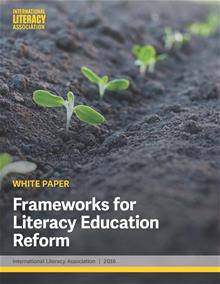ILA developed Frameworks for Literacy Education Reform in response to today’s complex and evolving education landscape. With an increase in English learners, high-stakes testing, and digital technologies driving new modes of teaching and learning, challenges for the classroom teacher are mounting. The new white paper’s frameworks serve as a high-level rubric that school administrators and policymakers can use to create or assess reform proposals. In this blog series, we’ll take a closer look at each of the frameworks.
 Schools provide the physical and conceptual structure for a student’s first learning experience—from learning to recognize letters and read to expressing ideas through writing. Each child starts school with a different level of literacy skills based on a variety of factors and it’s up to schools and those who bring schools to life (teachers, principals, administrators, etc.) to help children meet their potentials. Schools need to acknowledge the diverse levels of students’ literacy through adaptable curriculum, accountability measures, and the quality of resources available there.
Schools provide the physical and conceptual structure for a student’s first learning experience—from learning to recognize letters and read to expressing ideas through writing. Each child starts school with a different level of literacy skills based on a variety of factors and it’s up to schools and those who bring schools to life (teachers, principals, administrators, etc.) to help children meet their potentials. Schools need to acknowledge the diverse levels of students’ literacy through adaptable curriculum, accountability measures, and the quality of resources available there.
Making quality curricula and materials that are developed for individual students at the local level available to every school is critical to student success. When those curricula and materials are used effectively, accountability measures can be put into place. These assessments should be transparent, ethical, and fair.
“Unfortunately, there have been instances of unethical use of test scores in schools. Examples I have seen include making grading and/or retention decisions based on screening data and engaging students in extensive, direct test practice instead of instruction,” said Sharon Walpole, professor of education at the University of Delaware and lead writer on the schools section of Frameworks for Literacy Education Reform. “The same goes for outcomes. Policymakers who advocate only for absolute achievement rather than growth in achievement ignore the efforts of teachers in schools that struggle. Evaluations should look both at outcomes and at growth.”
Walpole said having students practice tests repeatedly instead of teaching a strong curriculum is also a disservice to students.
Schools should also incorporate technology into literacy curriculum, but judiciously and strategically. Students should be directed to evaluate information found online and could also use technology to help them both comprehend and compose, according to the frameworks.
To realize these goals, schools must be a place where administrators are supported to interpret state and federal standards and accountability, where staff members are enabled and encouraged to make decisions for their students, and where principals are prepared to provide consistent professional development for teachers to reach literacy goals.
“Schools and teachers have a responsibility to differentiate and to establish reasonable systems that use all available resources in as flexible a way as possible, taking advantage of assessments and providing additional instruction or additional challenge as soon as possible,” Walpole said. “Schools within districts, classes within schools, and students within classrooms may have different needs and should be treated differently, especially when it comes to resources.”
The complete white paper, Frameworks for Literacy Education Reform, can be found here.
 April Hall is editor of Literacy Daily. A journalist for 20 years, she has specialized in education, writing and editing for newspapers, websites, and magazines.
April Hall is editor of Literacy Daily. A journalist for 20 years, she has specialized in education, writing and editing for newspapers, websites, and magazines.